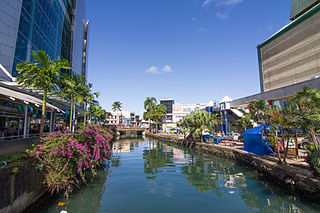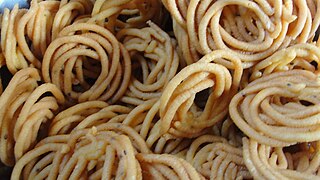External links
- Hike in prices of flour, sharp - The Fiji Times 15 November 2007
- Flour/Sharp prices to drop - Fiji Broadcasting February 19, 2009
Sharp flour is made from hard wheat. It is a term used by millers in Fiji and is in common usage throughout the populace as evidenced by newspaper reports whenever the price of flour changes, with the new price of sharp listed. Sharp is used as an ingredient for roti in Fiji.

A cereal is a grass cultivated for its edible grain. Cereals are the world's largest crops, and are therefore staple foods. They include rice, wheat, rye, oats, barley, millet, and maize. Edible grains from other plant families, such as buckwheat and quinoa, are pseudocereals. Most cereals are annuals, producing one crop from each planting, though rice is sometimes grown as a perennial. Winter varieties are hardy enough to be planted in the autumn, becoming dormant in the winter, and harvested in spring or early summer; spring varieties are planted in spring and harvested in late summer. The term cereal is derived from the name of the Roman goddess of grain crops and fertility, Ceres.

Fiji, officially the Republic of Fiji, is an island country in Melanesia, part of Oceania in the South Pacific Ocean. It lies about 1,100 nautical miles north-northeast of New Zealand. Fiji consists of an archipelago of more than 330 islands—of which about 110 are permanently inhabited—and more than 500 islets, amounting to a total land area of about 18,300 square kilometres (7,100 sq mi). The most outlying island group is Ono-i-Lau. About 87% of the total population live on the two major islands, Viti Levu and Vanua Levu. About three-quarters of Fijians live on Viti Levu's coasts, either in the capital city of Suva, or in smaller urban centres such as Nadi or Lautoka. The interior of Viti Levu is sparsely inhabited because of its terrain.

The economy of Fiji is one of the most developed among the Pacific islands. Nevertheless, Fiji is a developing country endowed with forest, mineral and fish resources. The country has a large agriculture sector heavily based on subsistence agriculture. Sugar exports and the tourism industry are the main sources of foreign exchange. There are also light manufacturing and mining sectors.

Flour is a powder made by grinding raw grains, roots, beans, nuts, or seeds. Flours are used to make many different foods. Cereal flour, particularly wheat flour, is the main ingredient of bread, which is a staple food for many cultures. Corn flour has been important in Mesoamerican cuisine since ancient times and remains a staple in the Americas. Rye flour is a constituent of bread in both Central Europe and Northern Europe.
Wheat flour is a powder made from the grinding of common wheat used for human consumption. Wheat varieties are called "soft" or "weak" if gluten content is low, and are called "hard" or "strong" if they have high gluten content. Hard flour, or bread flour, is high in gluten, with 12% to 14% gluten content, and its dough has elastic toughness that holds its shape well once baked. Soft flour is comparatively low in gluten and thus results in a loaf with a finer, crumbly texture. Soft flour is usually divided into cake flour, which is the lowest in gluten, and pastry flour, which has slightly more gluten than cake flour.

Gulab jamun is a sweet confectionary or dessert, originating in the Indian subcontinent, and a type of mithai popular in India, Pakistan, Nepal, the Maldives and Bangladesh, as well as Myanmar. It is also common in nations with substantial populations of people with South Asian heritage, such as Mauritius, Fiji, Gulf states, the Malay Peninsula, United Kingdom, United States, Canada, South Africa, and the Caribbean countries of Jamaica, Trinidad and Tobago, Guyana, and Suriname.

Taro is a root vegetable. It is the most widely cultivated species of several plants in the family Araceae that are used as vegetables for their corms, leaves, stems and petioles. Taro corms are a food staple in African, Oceanic, East Asian, Southeast Asian and South Asian cultures. Taro is believed to be one of the earliest cultivated plants.

A thickening agent or thickener is a substance which can increase the viscosity of a liquid without substantially changing its other properties. Edible thickeners are commonly used to thicken sauces, soups, and puddings without altering their taste; thickeners are also used in paints, inks, explosives, and cosmetics.

Brown bread is bread made with significant amounts of whole grain flours, usually wheat sometimes with corn and or rye flours. Brown breads often get their characteristic dark color from ingredients such as molasses or coffee. In Canada, Ireland and South Africa, it is whole wheat bread; in New England and the Maritimes, it is bread sweetened with molasses. In some regions of the US, brown bread is called wheat bread to complement white bread.

Adi Mere Tuisalalo Samisoni was a Fijian businesswoman and politician, from Lomaloma village on the island of Vanua Balavu in Fiji's Lau archipelago. Samisoni was formerly a member of Parliament for the opposition party SODELPA. She served as mayor of Lami and as a member of the now-defunct House of Representatives.

Shankarpali, shakkarpara, murali, khurma, lakdi mithai, or just simply mithai is an Indian sweet snack made from a dough of sugar, ghee, maida flour, and semolina. The name is derived from Persian Shekarpareh. Shankarpali is eaten in India, especially in Uttar Pradesh. Its variant known as khurma or laktho is also eaten in Bihar, Jharkhand, and eastern Uttar Pradesh. It is also eaten by the Indian diaspora in Fiji, Guyana, Mauritius, Suriname, Trinidad and Tobago, the United States, Canada, the United Kingdom, Australia, and New Zealand. It is traditionally eaten on Diwali and can be sweet, sour or spicy depending upon how it is made.
Sugar cane grew wild in Fiji and was used as thatch by the Fijians for their houses (bures). The first attempt to make sugar in Fiji was on Wakaya Island in 1862 but this was a financial failure. With the cotton boom of the 1860s there was little incentive to plant a crop that required high capital outlay but after a slump in cotton prices in 1870, the planters turned to sugar. In an effort to promote the production of sugar in Fiji, the Cakobau Government, in December 1871, offered a 500-pound reward for the first and best crop of twenty of sugar from canes planted before January 1873.
The flour riot of 1837 was a food riot that broke out in New York City in February 1837, and lasted less than a day. This violent civil disturbance grew out of a public meeting called by the Locofocos to protest runaway prices, as hungry workers plundered private storerooms filled with sacks of hoarded flour. Commodity prices had skyrocketed over the winter of 1836–37, an inflationary boom fueled by foreign investment and two successive years of wheat crop failures. The riot was also a sign of the impending financial crisis known as the Panic of 1837, that hit the American economy the following month.

Fijian cuisine has long consisted of primarily foraged and farm-grown food. Although rice, wheat, and tea all became staples during Fiji's colonial era, native Fijians still eat primarily tubers and coconuts. The cuisine of Fiji is known for its seafood and various green vegetables, including ''ota'', a young forest fern, and ''bele'', a plant that resembles spinach.

Sharp Corporation is a Japanese electronics company. It is headquartered in Sakai, Osaka, and was founded by Tokuji Hayakawa in 1912 in Honjo, Tokyo, and established as the Hayakawa Metal Works Institute in Abeno-ku, Osaka, in 1924. Since 2016, it is majority owned by the Taiwan-based manufacturer Hon Hai Precision Industry Co., Ltd., better known as Foxconn.

Muṟukku is a savoury, crunchy snack originating from the Indian subcontinent. The name muṟukku "twisting" refers to its shape.

Women in Fiji live in or are from the Republic of Fiji. On March 8, 2007, The Fiji Times ONLINE described Fijian women as playing an important role in the fields of economic and social development in Fijian society. The women of the Republic of Fiji are the "driving force" in health service as nurses and medical doctors. They are also key players and managers in the tourism and entertainment industries, as well as teachers in the field of education.
Cricket flour is a protein-rich powder made from crickets, using various processes. Cricket flour differs from true flours made from grains by being composed mainly of protein rather than starches and dietary fiber.

Gulgula is a traditional sweet made in different regions of India. It is one of the most popular sweets in the market places, it is traditionally made on specific festive occasions in rural areas. They are common in Uttar Pradesh, Bihar, Punjab, Odisha, Haryana, Rajasthan and are also made by overseas Indians in Guyana, Trinidad and Tobago, Suriname, Jamaica, Mauritius, the United States, South Africa, and Fiji.